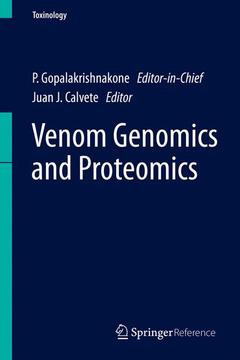Venom Genomics and Proteomics, 1st ed. 2016 Toxinology Series

This volume provides the reader with recent advances in the fields of molecular toxinology, the biotechnological applications of venom toxins, and antivenom production. The content of the twenty chapters of Venom Genomics and Proteomicsillustrates not only the enormous progress made since the implementation of omics technologies in the field of toxinology, but one also realizes the road still ahead to reach a holistic view of venomous systems. Advancement in high-throughput technologies in the field of venomics has resulted in the ability to generate comprehensive venom profiles for many species. However, research on snake genomes is still in its infancy, although such studies are eagerly awaited to gain insights into the evolutionary history of snake venom proteins, including the mechanisms that originated venom and the regulation of toxin expression. Fortunately, this objective is also at the reach of current omic technologies. Therefore it would not be unrealistic to predict a bright near future to the field of molecular toxinology.
Venom Genomics and Proteomics coversresearch into the venom of scaled reptiles (lizards and snakes), scorpions, spiders, ants and platypuses. Special consideration is given to a number of observations made in the area of snake venom and in the application of advanced genomics and proteomics techniques on a variety of venom samples. The final chapters give some insight into the potential clinical uses of venom derivatives and into the importance and challenges faced in the production and quality control of antivenoms.
Prof P. Gopalakrishnakone, M.B.B.S., Ph.D., F.A.M.S., D.Sc., is presently professor of anatomy and chairman of the Venom and Toxin Research Programme at Yong Loo Lin School of Medicine, National University of Singapore. He is also a consultant to the Defence Science Organization in Singapore and adjunct senior research scientist at the Defence Medical Research Institute. Prof. Gopalakrishnakone is an honorary principal fellow at the Australian Venom Research Unit, University of Melbourne, Australia. His research studies include structure function studies, toxin detection, biosensors, antitoxins and neutralization factors, toxinogenomics and expression studies, antimicrobial peptides from venoms and toxins, and PLA2 inhibitors as potential drug candidates for inflammatory diseases. The techniques he employs include quantum dots to toxinology, computational biology, microarrays, and protein chips. Prof. Gopalakrishnakone has more than 160 international publications, four books, about 350 conference presentations, and 10 patent applications. He has been an active member of the International Society on Toxinology (IST) for 30 years and was president from 2008 to 2012. He is also the founder president of its Asia Pacific Section, a council member, as well as an editorial board member of Toxicon, the society’s official journal. His research awards include the Outstanding University Researcher Award from the National University of Singapore (1998); Ministerial Citation, NSTB Year 2000 Award in Singapore; and the Research Excellence Award from the Faculty of Medicine at NUS (2003). His awards in teaching include Faculty Teaching Excellence Award 2003/4 and NUS Teaching Excellence Award 2003/4. Prof. Gopalakrishnakone also received the Annual Teaching Excellence Award in 2010 at both university and faculty levels.
Dr. Juan J. Calvete (Valencia, Spain, 1957) is research professor of the Sp
Presents recent advances in biotechnological applications of venom toxins
Covers research into the venom of lizards, snakes, scorpions, spiders, ants and platypuses
Illustrates the issues in the production and quality control of antivenoms
Includes supplementary material: sn.pub/extras
Date de parution : 01-2016
Disponible chez l'éditeur (délai d'approvisionnement : 15 jours).
Prix indicatif 505,35 €
Ajouter au panierDate de parution : 01-2016
Ouvrage de 454 p.
15.5x23.5 cm



